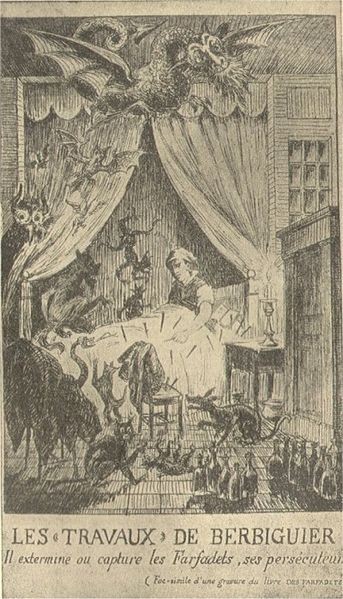Fous Littéraires: Some examples from a non-cannon- No.1
Alexis-Vincent-Charles Berbiguier de Terre-Neuve du Thym, known as Berbiguier (1764/76?–1851)

Before beginning a more in depth look at some of the most widely discussed fous, let us take a moment to reflect upon a few of the more beloved, if less well-analysed examples. (I remind the reader that these commentaries are intended for an English-speaking audience, whilst most of the geniuses discussed write in French. Generally, I have thus chosen to describe the work, rather than quote it., and then, mainly in English. French citations are given only when it is thought that these will help rather than hinder those not literate in French.)
Alexis-Vincent-Charles Berbiguier de Terre-Neuve du Thym, known as Berbiguier (1764/76?–1851) was an author and demonologist possibly suffering psychosis. He spent time at the (in)-famous clinic/asylum at Salpetriere, where he was attended by Philippe Pinel, a pioneer in psychotherapy. Today, Berbiguier is best remembered for his lengthy autobiography, Les farfadets ou Tous les démons ne sont pas de l'autre monde ("The Imps: or, All the demons are not from the other world"), financed from the profits of an inherited estate. (Clearly independent wealth is one pathway for attaining the status of a properly published fou.) Illustrated with lithographs of sketches by Berbiguier himself, the book relates his struggles with farfadets–imps or leprechauns. These are everywhere, in the form of snakes, eels, even hummingbirds, depriving the good man of his mental faculties, as well as causing him to sneeze and break wind copiously. Through research and experiment Berbiguier discovers a number of incantations and fumigations that keep the ceatures in check. Sometimes he captures one and locks it in a bottle. The chief tormentor is named Rhotomago, and he is the right hand tool of the Devil himself. Thus, when our hero fights back with his herbs and his words Lucifer is so outraged he sends threatening letters to Berbiguier directly; these carefully reproduced in the book. Berbiguier's title de Terre-Neuve du Thym was self-bestowed; "it means ‘of the New World of Thyme,’ and shows his hope that revealing his methods will renew the world and purge it of impish influences,” https://en.wikipedia.org/wiki/Alexis-Vincent-Charles_Berbiguier_de_Terre...
The frontpiece to Berbiguier's book, surrounded by the tools of his trade: "sulphur in the shape of a cross, thyme, a bull's heart pierced with thorns, and pins and needles," and Berbiguier's signature, with self-bestowed title, (https://en.wikipedia.org/wiki/Alexis-Vincent-Charles_Berbiguier_de_Terre...).
Berbiguier wrote his book to communicate his struggles and his methods to the world, and eloquently dedicated it:
TO ALL THE EMPERORS, KINGS, PRINCES, AND SOVEREIGNS OF THE FOUR PARTS OF THE WORLD
Milords,
Fathers of nations, you who represent the heavenly God of peace and consolation on earth, unite your efforts to my own to destroy the power of Demons, Witches, and Imps, that devastate the unhappy dwellers of your countries….
Ah! The diabolical persecutions of the Imps would have long since been ended on Earth, had one of your subjects had the courage to reveal them to you. It is in order to unmask them that I have dedicated my work to you, that you may not be heedless to my torments, and that you will work to end them now that they are known to you, (https://en.wikipedia.org/wiki/Alexis-Vincent-Charles_Berbiguier_de_Terre...).
For his troubles, Berbiguier has earned a place in the annals of psychiatry, as well as of literature, and his imps continue to fuel dictionaries of demonology, as well as to inspire other writers. Théophile Gautier used him as a model for his fantastic story Onuphrius, and even Flaubert consulted The Farfadets in preparation for Bouvard and Pecuchet. His work may also be seen as a precursor to Nerval and Nodier, whose works combine madness and the supernatural into a new kind of romanticism.
Fous Littéraires: Mad linguists and other literary fools